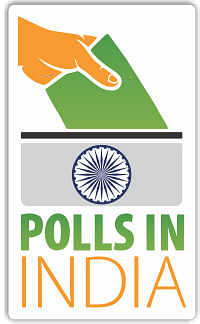India goes to polls today

India is all set for the first phase of its staggered parliamentary elections today, marking the start of the world's biggest and longest democratic exercise.
The nine-phase Lok Sabha election begins from the Northeast, where the sun shines on India first, with polling in five of the 14 seats in Assam state and one of the two constituencies in Tripura.
The six seats are part of the 543 parliamentary constituencies where polling will take place from today until May 12 and votes will be counted on May 16.
The ruling Congress is the major force in Assam while the Communist Party of India-Marxist (CPI-M) is the dominant force in Tripura.
An estimated 6.4 million people are eligible to cast their votes today to choose representatives in the Lok Sabha from Tezpur, Jorhat, Kaliabor, Dibrugarh and Lakhimpur constituencies in Assam.
According to the Election Commission, 51 candidates are contesting today's election in Assam. The remaining nine Lok Sabha members will be elected on April 12 (three) and 24 (six).
Police and paramilitary forces have stepped up security in Assam, considering that today is the rising day of the outlawed insurgents' outfit, United Liberation Front of Asom (ULFA).
"There is no specific threat for the election but we cannot take chances," said a senior official of the Assam police. As many as 240 companies of the Assam police and paramilitary forces had been deployed in the state.
Among the leading candidates in Assam are Chief Minister Tarun Gogoi's son Gourav, outgoing Congress lawmaker Bijoy Krishna Handique, federal ministers Ranee Narah and Paban Singh Ghatowar.
The West Tripura Lok Sabha constituency also goes to polls today. Polling in the Tripura East constituency will be held on April 12.
Narendra Modi, the 63-year-old prime ministerial candidate of the main opposition BJP, and his main challenger, 43-year-old Rahul Gandhi, the political heir of Nehru-Gandhi dynasty, of Congress party, have run a high-octane campaign, with many rallies across the country.
Modi, who stood from two constituencies in the holy Hindu city of Varanasi as well as Vadodara city in his home state of Gujarat, has promised to revive a $1 trillion infrastructure programme and create jobs to put Indian economy back on faster growth track after it suffered the longest slowdown since 1980s.
While Modi has cut red tape and overseen a period of high growth in Gujarat and is considered a favourite of corporate India, details of his policy plans, popularly known as "Modinomics", at the national level remain sketchy largely due to BJP's delay in releasing its manifesto so far, unusual for a party hoping to form next government.
Reports suggest BJP is bogged down by internal bickering on a range of political and economic issues to be included in the manifesto being drafted by a committee headed by former party chief Murli Manohar Joshi.
The delay has already given Congress, which made public its manifesto last month, a chance to Rahul Gandhi to attack the right-wing party alleging that it is divided over the document.
BJP leaders, particularly the younger lot, are reportedly upset that Joshi has not incorporated their suggestions in the manifesto.
BJP chief media coordinator Ravi Shankar Prasad on Friday, however, insisted that there were “no differences” within the party leadership over the manifesto.
Ahead of the voting, the electioneering was marred by an unseemly controversy when Modi's right-hand man Amit Shah spoke of “revenge” in Muzaffarnagar in India's politically key state of Uttar Pradesh that was hit by riots last year. His remarks on Thursday raised concerns over BJP's ability to protect India's secular traditions.
Congress charged Shah, who leads BJP's campaign in Uttar Pradesh, with making hate speeches while BJP defended it claiming that he was only asking the voters to use ballots as a weapon against a government that had “failed” to end religious violence in the state.

 For all latest news, follow The Daily Star's Google News channel.
For all latest news, follow The Daily Star's Google News channel. 




Comments